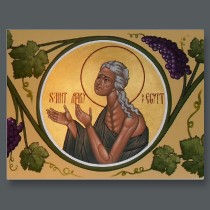|
|||
|---|---|---|---|
| This weekly bulletin insert complements the curriculum published by the Department of Christian Education of the Orthodox Church in America. This and many other Christian Education resources are available at http://dce.oca.org. | |||
|
The great desert saint Mary of Egypt is such a revered person, such an example of holiness, that we read the story of her life every year in church. We know many of the elements of her story. Years of what must have been a miserable childhood at home made her run away to the city of Alexandria. Then there were years of living as a beggar, and of superficial and soul-wounding encounters with men. We know how she followed a crowd of pilgrims to Jerusalem, even going with them to the Church of the Holy Sepulchre. At first she was barred from entering, until the Theotokos answered her prayers, allowed her to enter the church, and then sent her on her way across the Jordan to spend decades in the wilderness, repenting and through great effort growing into a seasoned spiritual warrior. Mary's journey into the desert puts her in the company of another great figure we read about. Genesis 12: 1-7 is the account of God telling Abram to "go from your country and your kindred and your father's house to the land that I will show you." Abram receives the promise that God will make of him a great nation, and bless him, and make his name great. Mary received a promise, too: the assurance of the Theotokos that the wilderness would bring her true peace. But for Mary, as for Abraham, doing God's will required a huge life change. For Abram (later Abraham) it meant leaving everything familiar and fundamental in his life. Along the way to his new home he would have to face famine, an angry Pharaoh, warring groups, and the continuing sadness of being childless. For Mary, who had fewer ties and far less stability than Abraham, the life change meant struggling to conquer the demon of lust that had driven and often overpowered her for so many years. She would have no human companions to help her, and she too would be in a new and unfamiliar place. She and Abraham both had to trust God completely.
One thing differentiates Abraham's experience from Mary's. He was constantly talking to people, sometimes to explain himself, sometimes to get himself out of bad situations, and sometimes to keep peace. Whether telling his wife Sarah to pose as his sister or giving his nephew Lot first choice of grazing land, Abraham's life was, and had to be, inundated with words and encounters. For Mary, there were no words of conversation, and until the monk Zossimus found her there were no encounters. Instead there was silence, the profound silence of the desert. Proverbs 14: 23 gives us an idea of the value of silence: "In all toil there is profit, but mere talk tends only to want." Mary's toil led to immense spiritual profit. The absence of "mere talk" was a necessary part of her effort, and her victory. |
|||

